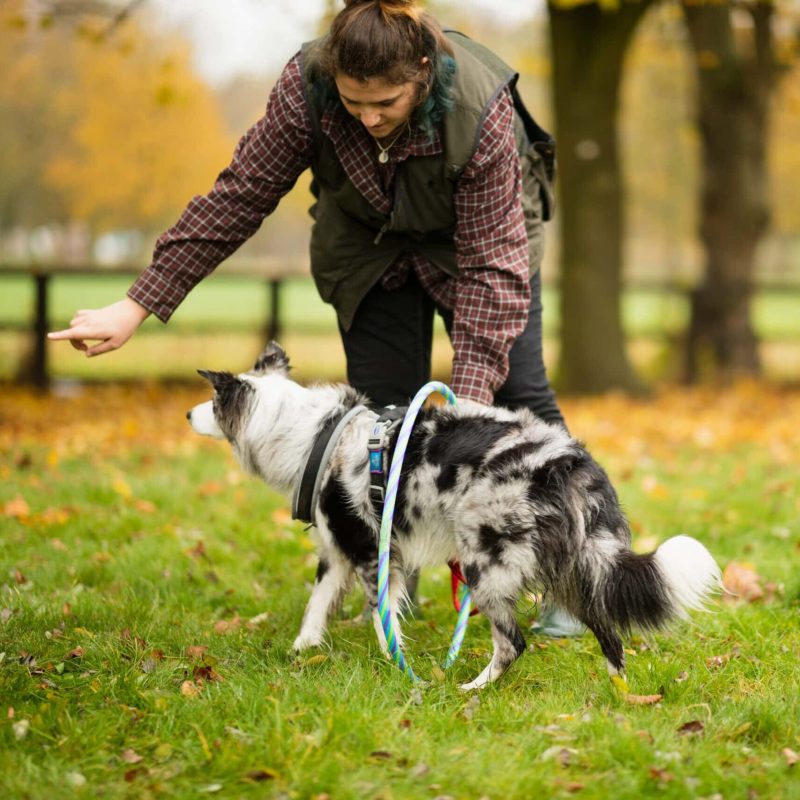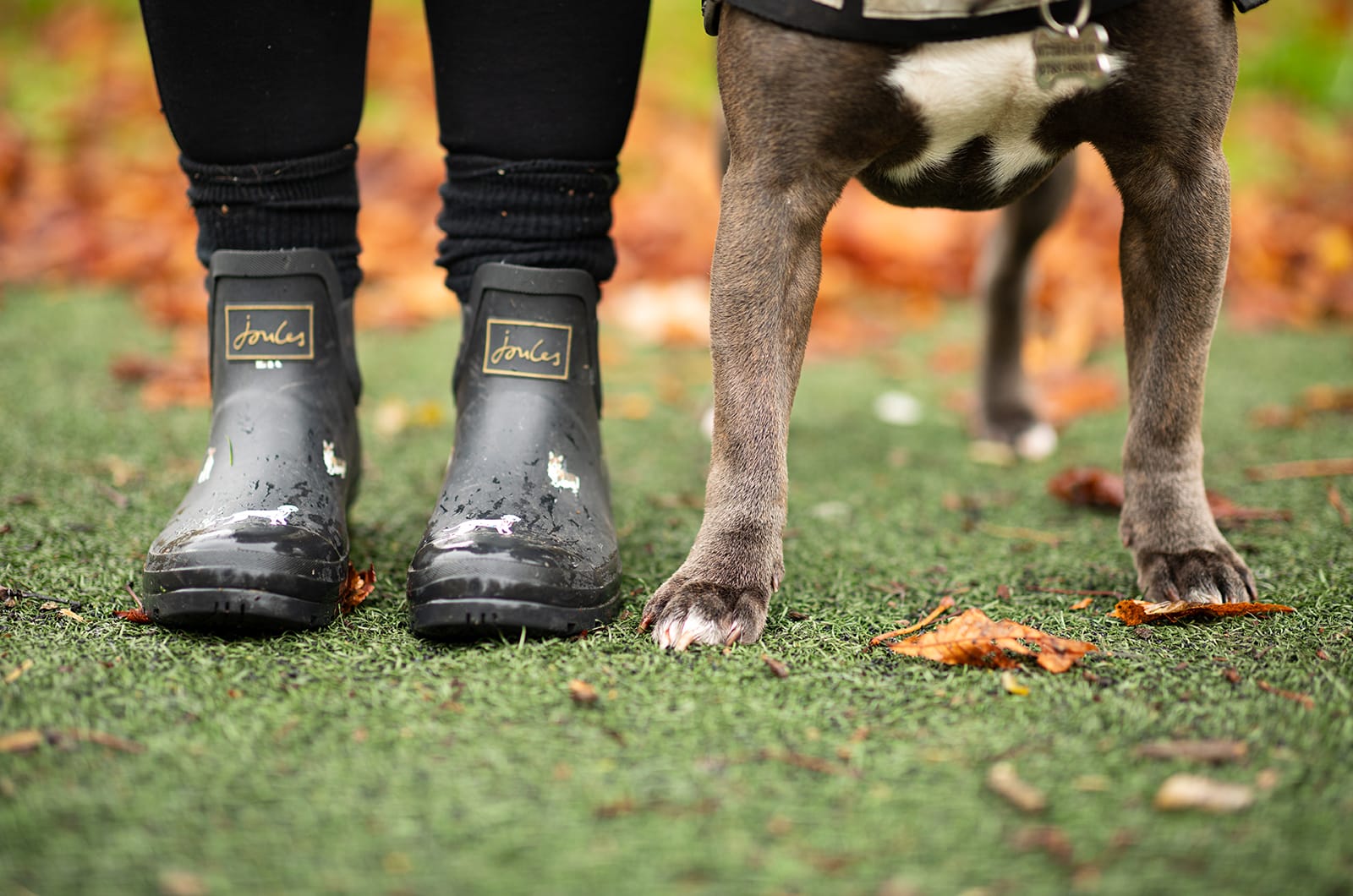If you have completed your Foundation degree in a canine-related subject, or you already have considerable canine knowledge, why not extend your learning for a year and top-up to a full BSc (Hons) in Canine Clinical Behaviour?
Recent figures have shown there are now over 12.5 million dogs in the UK, with 33% of households having a dog (Pet Food Manufacturers Association, 2021), and sharp increases in the number of dogs presenting with behavioural issues (PDSA, 2021). Subsequently, there is an ever growing demand for a range of canine-related services including professional dog trainers, behaviourists, dog walkers and sitters, kennel managers, rehabilitation of rescue dogs, and specialised training for assistance dogs in several categories, amongst others.


This course provides further opportunity for students to build on their knowledge, enhancing professional, academic and transferable skills. The top-up year ensures students develop a broad range of industry-relevant skills, suitable for self-employment or other canine professional roles following graduation.
The emphasis of this course focuses on canine welfare, clinical behaviour and ethical issues associated with domestic dogs throughout a variety of contexts and circumstances. In addition, the course includes essential business design and development specific to the canine industry.


Modules include:
Overall Workload
Your overall workload consists of class contact hours, independent learning and assessment activity, plus field trips. The following information gives an indication of how much time you will need to allocate to different activities at each year of the course:
Year 1: 14% of your time is spent in timetabled teaching and learning activity
Teaching, Learning and Assessment: 170 hours
Independent Study: 1030 hours
Assessment Methods
Assessments are designed to encourage both academic skills and skills valued in the workplace. They include a combination of coursework and examinations. Coursework may take many forms including: essays, reports, data processing, case studies, consultations, presentations, academic posters, seminar discussions, interviews, critical reviews and practical competency assessments. The examinations vary, depending on the nature of the module, but may take the form of essays, practical assessments and data handling questions.
The approximate percentage of the course assessed by coursework and examination is as follows:
Year 1
78% coursework
22% written exams
Feedback
Feedback is supplied via Turnitin or directly from the module tutor. The majority of submissions are made via Turnitin and feedback for coursework is provided within twenty working days after the submission date.
Written feedback will be supported verbally should the student require clarification. Formative assessment feedback will be provided at the time of completion where possible, with more detailed summative feedback for reports.
Students will be able to access course timetables for the academic year in September.
Timetables are subject to change, but most students can expect to spend 3-3.5 days per week on campus.
Tuition Fees
As a student at UCR, you will have two main costs to meet; your tuition fees and living costs.
Our full-time tuition fees for UK and EU students, entering University, can be found on our student finance page. These fees are charged for each academic year of a course and are set by the college annually.
Tuition fees for international students can also be found on our student finance page.
Additional Costs
Students may wish to purchase their own personal copies of recommended set-texts to assist them with their studies. A full list of recommended texts is made available prior to enrolment, however, our campus library boasts sufficient stocks of all major texts to support student learning, and the purchasing of texts is therefore advised but not compulsory.
Equipment Costs
Additional costs may include the purchase of Personal Protective Equipment (PPE) in order to undertake practical activities on the animal centre. These should include at least one pair of overalls (preferably blue/green) and a pair of steel toe-capped work boots/wellington boots. Additionally, students may wish to purchase other suitable outdoor wear in preparation for bad weather (i.e. waterproof/windproof coat). The above items can be purchased either independently or through the online shop.
Students may also wish to purchase the following training equipment:
Treat training pouch – whichever type you prefer (costs vary). You can use anything from a bumbag to a custom dog training pouch:
Approximately £20 for all training equipment (prices of training equipment are subject to change dependent on retailer).
Apply directly through UCAS
Successful completion of a Foundation Degree in Canine Behaviour and Training (or equivalent)
September 2022
September 2023
Full-time: 1 year
Here you will find useful information about the services and support available at University Centre Reaseheath. Click to expand each item:
University Centre Reaseheath is committed to providing additional financial support to those who need it. To find out about the bursary schemes available visit the additional financial support pages.
For students to get the best out of their time at University Centre Reaseheath, we must both recognise that we owe obligations to each other. These obligations are set out in our UCR Student Contract. Before you accept an offer of a place at University Centre Reaseheath, it is important that you read these contract conditions. If you are going to be living in Halls of Residence, you will also need to read the Student Accommodation Licence Conditions. Both of these contracts can be found here.
Click here to view the University Centre Reaseheath Student Protection Plan.
All UCR students are given the opportunity to apply for residential accommodation. First year students are guaranteed accommodation and this offer is made to all applicants who live more than a reasonable daily travelling distance from Reaseheath (providing you have applied before the UCAS equal considerations deadline. For full details on our halls of residence visit our accommodation page.
We have a team of dedicated professionals on hand to offer you support. These include our Student Services Team, Inclusive Learning Team, Library and Learning Resources Team and the Reaseheath Careers Service. You can find more information on the support provided at Reaseheath on our support page.
University Centre Reaseheath is proud to welcome international students. For more information, please visit our international students page.